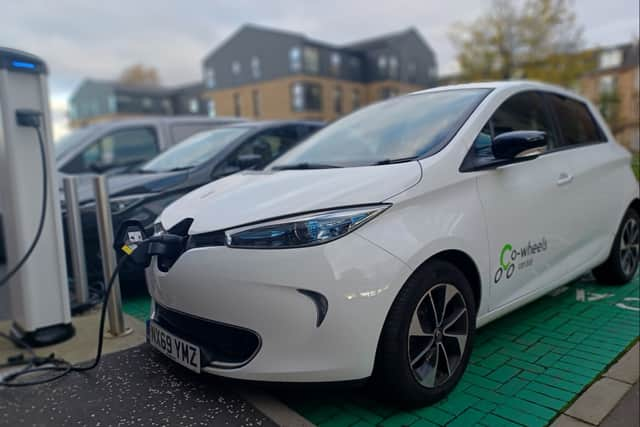How charging electric vehicles is being made easier for Glasgow flat owners
and live on Freeview channel 276
There are more than 2000 electric vehicles in Glasgow - but being the owner of an ultra low emission vehicle in the city is not without its challenges.
It’s estimated that around 40 per cent of homes in the UK do not have a garage or a driveway - a figure that is likely higher in Glasgow, a city famous for its tenements - thus making the charging process more difficult.
Advertisement
Hide AdAdvertisement
Hide AdWhile the number of electric vehicles in the city is on the rise, it is acknowledged that the lack of charging facilities in residential areas is a ‘significant barrier’ stopping people from making the change.
It raises the question: how do electric vehicle owners charge their cars if their home does not come with parking?
Help is at hand
Local authorities and charge point providers are taking actions to help solve this problem.
An Electric Vehicle Association Scotland spokesperson said: “Without a garage or driveway, those who live in apartments can easily operate an EV using home charging. EV owners without off-street parking should approach their local council to explore the possibility of a public on-street charger. Currently, councils can access additional funding for these.
Advertisement
Hide AdAdvertisement
Hide Ad“For those with off-street parking, they need to engage with landlords and factors to find solutions that will work for all parties.
“It is essential that pricing for charge points on street or residential parking is set to provide an equitable service for these users. We need to ensure that no-one is left behind, disadvantaged or penalised because of where they live.”
What help does Glasgow City Council offer?
The local authority has a programme to expand and develop electric vehicle charging points across the city, for both domestic and commercial purposes.
In early 2020, Glasgow had 164 charging points - a number that has grown since then - and Glasgow City Council is aiming to install chargers in residential areas.


Advertisement
Hide AdAdvertisement
Hide AdA spokesperson added: “We have accessed the On-Street Residential Charging Scheme to help expand the network of public charging points in Glasgow. In 2020/21 we secured £223k from the fund to support an overall project worth £298k to install 80 residential chargers across the city.
“We are hoping to gain further support from the fund this year which help extend further the public network.
“Our approach to on-street residential charging points is to ensure the widest possible geographic spread of chargers across the city. This way we hope to make chargers and therefore electric vehicles as accessible as possible to the city’s population.”
Why is it a problem?
According to Electric Vehicle Association Scotland, around 85 per cent of EV owners recharge their car batteries at home although the rapid growing network throughout Scotland – approximately 3000 and increasing rapidly each month. Many of these charge points are free, although most councils are introducing charging tariffs soon if they have not already done so.
Advertisement
Hide AdAdvertisement
Hide AdDr Euan McTurk, an electrochemist and member of EVA Scotland, said that many Scottish councils were listening to the needs of EV owners and are already putting charging points near homes where EV drivers have no garage or driveway.
He said: “Over the last ten years there has been a tremendous improvement in battery technology with cars now capable, on average of around 200+ miles on a full charge. This is normally enough for most people’s driving needs. The pace of improvement in this area is quite amazing. Plugging in every night it not essential.
“For those people living in flats, there is the opportunity to charge up at either communal car parks - as Dundee City Council have done, with large hubs on the top of several of their car parks where local residents can plug in overnight and remove their cars the next morning to allow commuters entering the city to charge.
“Other local authorities are installing discreet charge points along streets throughout the country which will serve residents in properties such as tenement flats and terraced houses.”
What are other councils doing?
Advertisement
Hide AdAdvertisement
Hide AdEast Lothian Council and Connect Kerb are taking part in the ‘Agile Streets’ pilot, seeking to provide time of use pricing to those without off-street parking, offering close price parity with home tariffs.
Some electricity supply providers (like Octopus Energy’s ‘GO’ tariff) offers customers special charging rates between 12.30-4.40am which are one third of the normal daily electricity prices.
Dundee currently has four main charging hubs in the city, which provide more than 20 charge posts, including the UK’s first solar-powered EV charging. Further hubs are planned and the city’s three main multi-storey car parks now have charge points.
Comment Guidelines
National World encourages reader discussion on our stories. User feedback, insights and back-and-forth exchanges add a rich layer of context to reporting. Please review our Community Guidelines before commenting.
